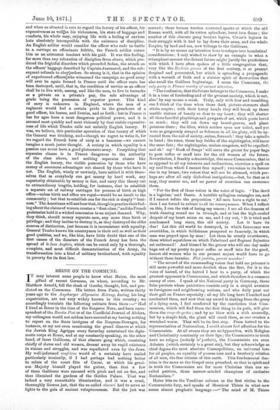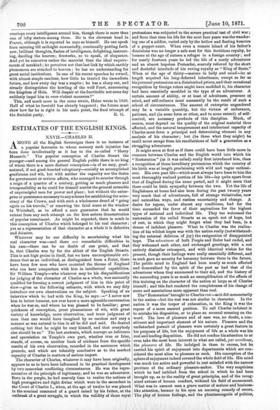HEINE ON THE COMMUNE.
IT may interest some people to know what Heine, the most gifted of recent Germans, on whom, according to Mr. Matthew Arnold, fell the cloak of Goethe, thought, felt, and pre- dicted on the Commune. His letters from Paris, written thirty years ago to the Augsblyger Allgemeine Zeitung, during his long expatriation, are not very widely known in this country ; we accordingly translate the following extracts from them :—" Had I lived at Rome in the time of the Emperor Nero, and been corre- spondent of the Bceotia Post or of the Unofficial Journal of Abdera, my colleague would not seldom have sneered at my having nothing to report on the State intrigues of the Empress-Dowager, for instance, at my not even mentioning the grand dinners at which the Jewish King Agrippa every Saturday entertained the diplo- matic corps at Rome, and at my constantly speaking, on the other hand, of those Galileans, of that obscure gang which, consisting chiefly of slaves and old women, dreamt away its vapid existence in visions and straggles, and was repudiated even by the Jews. My well-informed confreres would of a certainty have smiled particularly ironically, if I had perhaps had nothing better to relate of the court fete of Qom, at which his graci- ous Majesty himself played the guitar, than that a few of these Galileans were smeared with pitch and set on fire, and thus illumined the gardens of the Golden Palace. That was indeed a very remarkable illumination, and it was a cruel, thoroughly Roman jest, that the so-called obscuri had to serve as lights to the gala of ancient voluptuousness. But the jest was
marred ; these human torches scattered sparks at which the old Roman world, with all its rotten splendour, bust into flame ; the
number of this obscure gang became legion, Clesar's legions in their struggle with it had to lay down their arms, and the whole Empire, by land and sea, now belongs to the Galileans.
"It is by no means my intention here to relapse into homiletical considerations ; I only wished to show by an example in what a triumphant manner the distant future might justify the predictions with which I have often spoken of a little congregation that, very like the Ecclesia pressa of the first century, is at present despised and persecuted, but which is spreading a propaganda with a warmth of faith and a sinister spirit of destruction that also recall the Galilean beginnings. I mean the Commune, the only party in France worthy of earnest attention.
"The confession, that the future belongs to the Commune, I make it in a tone of foreboding and of the greatest anxiety, which is not, alas ! by any means a mask. Truly, only with fear and trembling can I think of the time when these dark picture-stormers shall attain empire ; with their horny hands they will break up those marble statues of beauty so dear to my heart ; they will shatter all those fanciful playthings and gewgaws of art, which poets loved . so much ; they will cut down my laurel-groves, and plant potatoes there ; the lilies, which neither spun nor toiled, and yet were as gorgeously arrayed as Solomon in all his glory, will be up- rooted from the soil of society, unless, forsooth ! they take a spindle in hand ; the roses, those lazy brides of the nightingales, will incur the same fate ; the nightingales, useless songsters, will be expelled ; and ah ! my 'Book of Songs' will serve the grocer for paper bags to pour coffee or snuff into for the old women of the future. Nevertheless, I frankly acknowledge, this same Communism, that is so opposed to all my interests and inclinations, exercises a spell on my soul from which I cannot free myself ; two voices in its favour rise in my breast, two voices that will not be silenced, which per- haps are after all only diabolical instigations,—but, be that as it may, they master me, and no power of exorcism can overcome them.
"For the first of these voices is the voice of logic. 'The devil is a logician,' said Dante. A horrible syllogism entangles me, and if I cannot refute the proposition 'All men have a right to eat,' then I am forced to submit to all its consequences. When I reflect on this, I run the risk of losing my senses ; I see all the demons of truth dancing round me in triumph, and at last the high-souled despair of my heart seizes on me, and I cry out, It is tried and condemned long since, this old society. Let it have its due ! Let this old world be destroyed, in which Innocence was overridden, in which Selfishness prospered so famously, in which man was preyed upon by man ! Let them be utterly overthrown, those whited sepulchres on which Falsehood and flagrant Injustice sat enthroned ! And blessed be the grocer who will one day make bags out of my poetry to pour coffee or snuff into for the good, honest old women who in our present unjust world have to go- without these luxuries. Fiat justitia, pereat mundus I
"The second of the commanding voices that hold me prisoner is still more powerful and more devilish than the first, for it is the voice of hatred, of the hatred I bear to a party, of which the greatest opponent is Communism, and which therefore is a common enemy of ours. I speak of the National party in Germany, those false patriots whose patriotism consists only in a stupid aversion to foreigners and neighbouring nations, and who daily pour out their gall on France especially ; all my life long have I loathed and combatted them, and now that my sword is sinking from the grasp of a dying man, I feel comforted by the conviction that Com- munism, which will find them the first thing in its path, will give them the coup-de-grace; and by no blow with a club assuredly, but by a simple kick, the giant will crush them, as one crushes a wretched worm. That will be its first step. From hatred to the representatives of Nationalism, I could almost feel affection for the Communists. At all events they are no hypocrites, with Religion and Christianity constantly on their lips ; the Communists in truth have no religon (nobody is' perfect), the Communists are even Atheists (which certainly is a great sin), but they acknowledge as chief dogma the most absolute Cosmopolitism, an universal love for all peoples, an equality of possess ions and a brotherly relation of all men, the free citizens of this earth. This fundamental doc- trine is the same as the Gospel once preached, so that in spirit and in truth the Communists are far more Christian than our so- called patriots, those narrow-minded champions of exclusive Nationalism."
Heine hits on the Vendome column as the first victim to the Communistic fury, and speaks of Monsieur Thiers in what now seems almost prophetic language :—" The mind of M. Thiers overtops every intelligence around him, though there is more than one of lofty stature among them. He is the cleverest head in France, although it is reported he says so himself. He can speak from morning till midnight unweariedly, continually putting forth new, brilliant thoughts, flashes of intelligence, delighting, instruct- ing, dazzling the hearers; fireworks, so to speak, of eloquence. And yet he conceives rather the material than the ideal require- ments of mankind ; he perceives not that last link by which earthly phenomena are attached to heaven ; he has no understanding for great social institutions. In one of his recent speeches he owned, with almost simple candour, how little he trusted the immediate future, and how every day was a respite ; he has a sharp ear, and already distinguishes the howling of the wolf Fenri, announcing the kingdom of Hela. Will despair at the Inevitable not some day suddenly impel him to over-violent measures ?"
This, and much more in the same strain, Heine wrote in 1840. Half of what he foretold has already happened ; the future must show how far he is right in his main point, the final triumph of



































 Previous page
Previous page